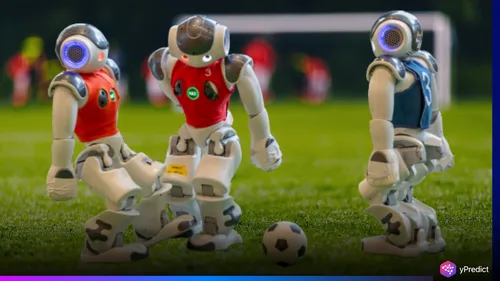
The AI world never sleeps. This week brought an interesting contrast between two global tech narratives. On one hand, Microsoft, a dominant player in the AI space, is being criticized for playing it too safe, causing some to nickname it “Mega-Soft.” Whereas China captured the innovation headlines with humanoid robots playing soccer showing just how far the innovation curves are moving in real-world applications.
With every technology company chasing breakthroughs nowadays, these examples show how different innovation speeds can be. One company focuses on control and compliance, while the other achieves physical boundaries with AI-powered machines. There’s obviously some competition as companies pursue growth, but these contrasts can tell you much larger strategies that are advancing the future of artificial intelligence.
Microsoft Faces Backlash for Playing It Too Safe
The AI approach of Microsoft is being questioned. A number of voices in industry are arguing that the company has become overly timid, aiming to protect its brands and partnerships while avoiding creating any cutting-edge products. Some commentators have claimed that Microsoft today is acting more like a regulatory organization than an AI leader.
This perception emerged after several key updates and demos failed to excite users. Critics believe Microsoft has prioritized enterprise customers and compliance over user experience and open experimentation. While their Azure AI tools offer stability and scalability, they lack the risk-taking spirit found in other leading AI companies.
The phrase “Mega-Soft” has gained popularity among tech analysts. It implies that the company is more focused on managing risk than leading AI innovation. This criticism highlights a widening gap between commercial viability and public excitement in AI development.
China’s Robotic Soccer Players Show Real-World AI Advancements
In sharp contrast to Microsoft’s cautious strategy, Chinese researchers are pushing AI into the physical world. A new highlight this week came from the University of Science and Technology of China, where humanoid robots were seen playing soccer at a remarkable level of coordination.
These robotic soccer matches are not just flashy displays. They demonstrate real-time decision-making, teamwork algorithms, and human-like motion in machines. The project uses advanced reinforcement learning and real-world simulations, enabling robots to adapt their strategy based on opponent movements and team dynamics.
This is more than just a novelty. Robotic soccer has become a testing ground for future applications in logistics, security, and disaster response. As China continues to develop these capabilities, it signals a shift in how AI transitions from screens to the physical environment.
Are Western Companies Falling Behind in Real-World AI?
American tech giants like Microsoft, Meta, and Google continue to invest heavily in language models and generative AI tools. Meanwhile, Chinese companies are focusing more on AI that interacts with the physical world. This split between digital and physical AI could reshape global AI leadership in the coming years.
Experts believe the U.S. still leads in software-based AI. But countries investing in robotics and embodied AI could soon challenge that lead. China’s progress in robotic soccer shows strong technical skills and smart planning for the future. Moving machines with AI is harder than generating text, which gives China a possible edge.
If Microsoft AI intends to remain competitive, they may need to expand the interpretation of Azure services beyond offering a chatbot. Advancing the scenario of AI in the real-world, will make all the difference to be recognized as an industry leader.
What These AI Trends Mean for the Future
The divergence in AI strategy we saw this week, between caution and experimentation, exemplifies large-scale global approaches to technology. Microsoft is safeguarding trust and regulatory alignment, while China exhibits a willingness to experiment in competitive and unpredictable ways.
These trends in AI are significant for businesses, governments, and developers. Through Microsoft AI tools, from soccer players who are robots, the future will belong to those who balance the spirit of experimentation with responsibility.






